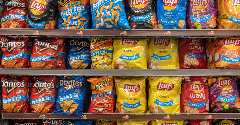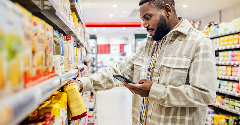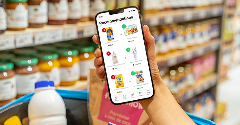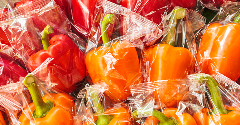News
Tesco partners with Olio to reduce food waste in U.K.
1 Oct 2020Tesco is partnering with the food sharing app Olio to redistribute surplus food nearing its sell-by date from its stores to local communities and individuals that are food insecure. The two companies will roll out this effort across all of Tesco’s 2,700 UK branches.
Collaboration between Tesco and Olio on an ongoing basis follows a successful six month trial across 250 Tesco stores last year. As a result of the initial trial period, the duo redistributed 36 tons of food or 93,000 meals that fed 4,200 people.

Food waste is a big concern for both consumers and governments globally. With predictions from the World Economic Forum that it will require a 50% to 100% increase in food production by 2050 to feed the world's population, the question of how to divert food from being wasted is becoming a pressing concern for many. Not only is the feasibility of feeding future populations coming into question, but the cost associated with food waste is staggering. In the U.K., The Guardian reported that households toss £15 billion of edible food, costing families £730 annually.
Supermarkets too contribute to this food waste, albeit on a smaller scale than consumers themselves. According to the United Nations, wasted food, which can be unharvested or disposed of products, amounts to 30% of what is produced. Tesco is looking to combat these statistics with this initiative with Olio that builds on previous promises to reduce waste. In 2009, the supermarket chain committed to stop sending food products to landfills. Then in 2016, the company launched Community Food Connection (CFC) through which surplus food is donated to local charities and community groups. The Guardian reported that monthly, Tesco donates 2 million meals across the UK.
In this newest undertaking, Tesco is relying on Olio’s 8,000 local “Food Waste Heroes” who are volunteers that visit Tesco supermarkets and collect products that are nearing their sell-by date. The food, which is all verified to be safe for human consumption, is uploaded by the volunteers onto the Olio app and then redistributed for free to those who request aid. Pickup is arranged through an in-app messaging system and is then dropped off at a coordinated, contact-free pickup point. During the pilot, it took less than an hour for app users to claim half of all the food listings.
“Right now we want to make sure that any surplus food is being managed and people who need it have access to it,” Tesco head of communities, Claire De Silva said in a statement.
Related news

PepsiCo formulates ‘naked’ Cheetos and Doritos products
31 Dec 2025
US food giant PepsiCo has launched its Simply NKD range, a move it says reimagines its popular products with new formulations free from artificial flavours, dyes, and colours.
Read more
Debate over ban on ‘meaty’ names for plant-based products reaches stalemate
26 Dec 2025
The debate over a ban on plant-based products using “meaty” terms has reached a stalemate, leaving manufacturers in limbo and still facing overhauls to their marketing and packaging.
Read more
Ingredient transparency key to success in European natural health market
12 Dec 2025
Europe’s $40.7 billion supplements market is growing fast, fuelled by demand for products that support healthy ageing, mental wellbeing, and preventive health, say experts.
Read more
Whole Foods Market forecasts fibre frenzy for 2026
11 Dec 2025
Whole Foods Market has released its top 2026 trends, predicting that a fibre frenzy will take place next year as health-conscious consumers seek out nutritious, filling options.
Read more
Which sustainability-related labels are consumers willing to pay a premium for?
10 Dec 2025
Products with animal welfare and geographic origin labels elicit a higher willingness to pay a premium than those with carbon-related labels, research suggests.
Read more
Sorghum emerges as better-for-you hero ingredient
9 Dec 2025
With the launch of Novak Djokovic’s sorghum-based brand, the grain’s popularity in the better-for-you snacking sphere is on the rise, thanks to its nutritional and sensory properties.
Read more
Turning global trade challenges into opportunities
4 Dec 2025
While our food innovation ecosystem is in a healthy place, certain barriers persist. A panel of experts at Fi Europe shared their ideas and strategies for overcoming these, to fully unleash Europe’s potential.
Read more
Yuka’s food scanning app helps consumers make healthier choices
2 Dec 2025
Global food scanning app Yuka helps consumers understand the content of their shopping baskets and shapes producers’ reformulation plans.
Read more
Plastic packaging toxicity a ‘ticking timebomb’ for FMCG companies
1 Dec 2025
Studies on the toxicity of plastic have spiked in the past decade – and the evidence points to a “ticking timebomb” for manufacturers and consumers alike, an analysis suggests.
Read more
Non-UPF Program extends certification scheme to entire food industry
30 Nov 2025
The Non-UPF Program has extended its certification scheme to the wider food sector, championing a move towards healthier consumption habits.
Read more